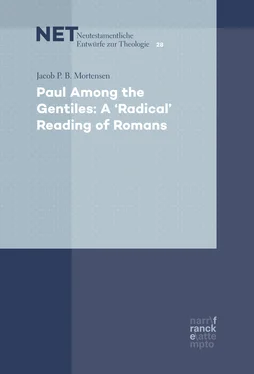Paul’s (and Peter’s) identity
If Paul tried to make Gentiles behave jewishly because of their adherence to his mission, what did he himself do, because of his belief in Christ? Galatians 2:11–14 may offer some clues. Paul and Peter are Jews, but Paul asks Peter why he ‘lives like a Gentile’ (ἐθνικῶς) and not ‘like a Jew’ (Ἰουδαϊκῶς), even though he is a Jew (Ἰουδαῖος). And since this is what he does, why then does he convince Gentiles to Judaize (ἰουδαΐζειν)? This minor exchange makes it appear as though Paul presents two possible options for a Jew: A Jew may live either ἐθνικῶς or Ἰουδαϊκῶς. What he does by presenting this choice to Peter is to transform the nouns into adverbs – words describing the way something is done. This makes it appear as though Paul and Peter had to choose the way they wanted to live, whether they wanted to live Ἰουδαϊκῶς (‘Jewishly’, with an upper-case J, since they are in fact ethnic Jews) or ἐθνικῶς (gentilishly with a lower-case g, as they are in fact not ethnically Gentiles).
From the foregoing minor exchange we must realize that Paul does not speak to Peter of becoming a Gentile. Paul speaks of the possibility of living or acting like a Gentile. Paul chose to live his own life gentilishly for pedagogical and theological purposes (to win more people, 1 Cor 9:19–22). But he criticizes Peter for not being consistent with one choice. First, Peter chose to live gentilishly, like Paul; but when ‘those from James’ arrived (Gal 2:12), he withdrew and separated himself from the Gentiles, in order to appear Jewishly (Ἰουδαϊκῶς).
In Gal 2:19, Paul explains his own choice: ‘For through the Law I died to the Law, in order that I might live to God’. Many commentators take this verse to indicate that Paul left Judaism and a life under the (Mosaic) law,1 but this may not be what he actually intended. Gal 2:19 may state that Paul exchanged the elements of his Jewish identity to gain access to Gentile communities; Gal 2:19 may state that Paul adjusted his Jewish observances so he could eat and live gentilishly, with Gentiles, without asking them to observe the (Mosaic) law.2 Thus, Paul’s strategy of constructing his own identity would mirror, albeit inversely, the one he applies to the Gentiles: He does not ask the Gentiles to become Jews and to live like a Ἰουδαῖος by following the law (ἰουδαΐζειν). Instead, he himself starts to live gentilishly (ἐθνικῶς) when he is around Gentiles, because he considers himself to be ‘apostle to the Gentiles’ (ἐθνῶν ἀπόστολος, Rom 11:13). His vocation as ‘apostle to the Gentiles’ requires this shift in priorities, but not in order to start a new religion or ‘go beyond’ Judaism. On the contrary, he adapted to the sinful, unrighteous, and unjust Gentiles so that the God of Israel might reward him on the day of judgement (cf. similarly Phil 2:5-11), and that God’s plan of extending his mercy to the Gentiles, so they will ‘rejoice with his people (Israel)’ (Rom 15:10), might be fulfilled as soon as possible. Consequently, Paul may not have compromised his faithful practice of the (Mosaic) law. What he did was to behave like a Gentile and act gentilishly (ἐθνικῶς) when he lived among Gentiles. And whatever this adaptation meant, Paul did not perceive it as compromising his faithfulness to Israel, to God, or to the (Mosaic) law.
Concluding remarks and evaluation
The foregoing presentation makes it seem that radical scholars conclude that Paul addressed his gospel about a Jewish Messiah to Gentiles. The ‘radicals’ claim that Paul did not ask these Gentiles to become Jews, or to become something new, such as ‘Christians’, or to remain what they used to be (pagan Gentiles). Instead, the ‘radicals’ claim that Paul sought out ways for these Gentiles to be affiliated to Judaism and to behave jewishly without becoming actual Jews. This request from Paul to his Gentile addressees may be described in a variety of ways each of which highlights different aspects of the identity-construction of his addressees. Caroline Johnson Hodge and Joshua Garroway primarily use etic designations. They reach their conclusions through a theoretical discussion of identity formation and group-belonging. Paula Fredriksen and Mark Nanos primarily work with ancient and emic descriptions of ‘Gentiles affiliated with Judaism’. Fredriksen and Nanos furnish their description with a theoretical awareness of the impossibility and inadequacy of trying to understand outlooks that existed thousands of years ago.
I consider it unnecessary to choose among the above-presented types of terminology, or to go beyond what the radical scholars have proposed. There is not yet any consensus among radical scholars concerning how to describe these ‘in-between’ or ‘border’ identities. Consequently, I will not confine myself to only one of the above-presented alternatives, nor will I develop any other terms for describing these ‘in-between’ Gentiles. Instead, I will use the various alternatives provided by the radical scholars as they seem to fit my analysis, because my model reading of Romans proceeds from the radical perspective. My point of departure rests on the assumption formulated by radical scholars, that Paul addressed his message only and exclusively to Gentiles. I work with these descriptions of Paul’s addressees as jewish ish Gentiles. In the following chapters and in the actual exegesis I will support and substantiate the claim that Paul only and exclusively addressed his message to Gentiles, but for now I will stick to the terminological discussion.
The key insight to bring along in the following exegesis – as different as it is from many New Perspective scholars in terms of terminology – is that Paul did not try to make anyone Christian. Neither did he create a new religion called Christianity. Some, but definitely not all New Perspective scholars, agree on this point.1 What Paul did was to try to incorporate Gentiles behaving jewishly into Judaism as holy ones, faithful ones, brothers and sisters, heirs of Abraham, wild olive shoots engrafted unto a cultivated tree, freed slaves adopted as sons, and a new creation. He did not create any ‘Christian churches’. He organized assemblies (ἐκκλησίαι) of former pagan Gentiles behaving jewishly, and he made sure these assemblies were connected to and affiliated with Judaism.
3 Introductory Questions – Gentile addressees
A real letter (epistolography)1
Paul’s letter to the Romans is a real letter.2 Even though Paul incorporates and combines various rhetorical styles or types (diatribe, protreptic), literary features (epistolary opening and closing), literary devices and formulas (quotes and hymns), Romans still appears to be a genuine letter with a sender (Paul, 1:1) and a recipient (‘all God’s beloved in Rome’ (πᾶσιν τοῖς οὖσιν ἐν Ῥώμῃ ἀγαπητοῖς θεοῦ), 1:7). Romans fits a fairly regular and consistent macrostructural epistolary pattern, and there are plenty of conventional epistolary elements to define it as a ‘real’ letter.3 There is an opening (1:1–7), a body (1:8–15:33), and a closing (16:1–24). But Romans also demonstrates close resemblances to stylistic features of ‘literary’ letters ( e.g. Seneca and Epictetus). Paul’s letters display – as does Romans – familiarity with private letters, official letters, and philosophical (literary) letters.
The paraenetic part of the letter (chapters 12–15) bears witness to the specific situation of the letter, in which Paul intends to intervene. In particular, chapters 14 to 15 concerning ‘the weak’ and ‘the strong’ support the identification of the letter as a real letter.4 The letter addresses a specific situation in Rome, and should be considered neither a ‘theological compendium’ (Melanchthon)5 nor Paul’s ‘last will and testament’ (Bornkamm).6 In order for the letter to be read as a real letter, the ‘theological’ part of the letter (1–11) must be perceived as laying the foundation upon which the specific exhortations may be effectively made, just as in Galatians. But for that strategy to be effective, the letter as a whole must present itself as a continuously developing argument. Consequently, there must be some unifying features throughout that hold the letter together as a continuous and developing argument. I will turn to this specific element in the following chapter. However, it is precisely this combination of the paraenetic part and the theological part – and the coherence and development from one part to the other – which has presented the greatest problems for scholars. Scholars have wondered how the description of the ungodly in 1:18ff. may be said to lead naturally into the apostrophe in chapter 2, which continues with the proclamation of justification by faith in chapter 3, which leads to the discussion of Abraham and Adam in chapters 4 and 5; and what about the confessions of the ‘I’ in chapter 7, and the question of Israel and the remnant in chapters 9 to 11, and the ‘strong’ and the ‘weak’ in chapters 14 to 15, and all the names in chapter 16? Unless we identify the correct point of departure, we will inevitably become lost in the fascinating world of Romans, and lose sight of the specific historical occasion and purpose of the letter.
Читать дальше












